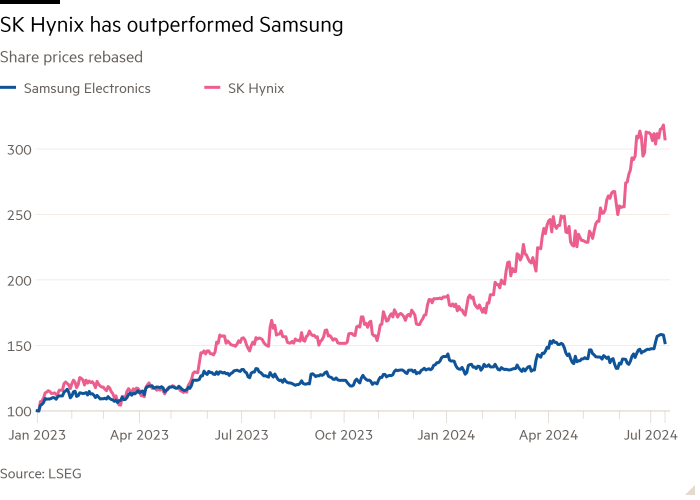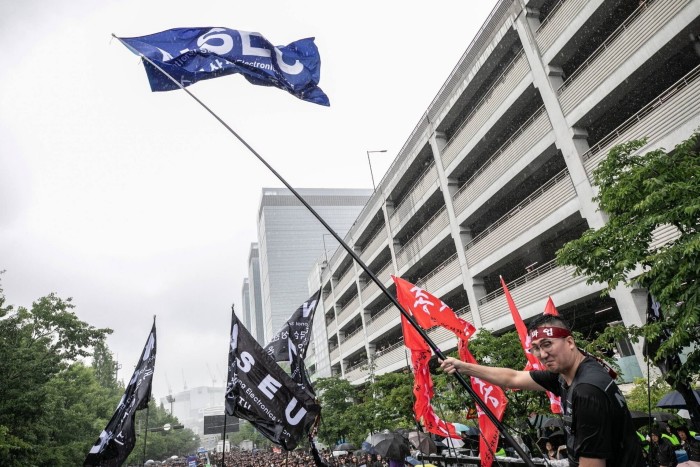Samsung Electronics is grappling with a growing labor shortage that is complicating its efforts to find competitors in the growing market for semiconductors used in artificial intelligence centers.
The Korean tech giant excited investors earlier this month with its expectations that second-quarter operating profit will increase 1,500 percent year-on-year, while the global memory market you are reeling from a long slump.
But the stronger-than-expected guidance came amid growing labor unrest and disruptions in chip production that saw it fall behind rivals in areas identified as key for future growth. Samsung shares are up 7.5 percent this year, versus a 65 percent rally for smaller domestic rival SK Hynix.
Samsung is following SK Hynix and US chipmaker Micron to develop high-bandwidth memory (HBM) chips, which are a key part of AI systems, and are yet to pass the necessary tests to qualify as an HBM supplier to industry leader Nvidia.
“This is very concerning for a company that has always been a leading memory manufacturer,” said Myron Xie, an analyst at chip consultancy SemiAnalysis. “HBM is a very lucrative product so Samsung is missing out on a huge opportunity.”

Samsung has also failed to make a dent in TSMC’s dominance of its core global business – the contract manufacturing market for processor chips – despite hopes that larger buyers will seek to reduce reliance on see to the Taiwanese giant amid mounting political risks.
“While customers may prefer the second type of facility, the priority for customers is the quality of the technology and being able to have a stable source of supply, which the Samsung foundry did not deliver,” said Xie.
In May, Samsung chairman Lee Jae-yong unexpectedly installed the new head of Samsung Electronics’ device division, industrialist Jun Young-hyun, who promised to “renew the atmosphere inside and out” in solve the “chip” problem in the company.
But a Samsung chip engineer, who spoke on condition of anonymity, told the Financial Times that “they don’t see much change even after our king is replaced”.
“The internal atmosphere is disappointing as we fall behind SK Hynix in HBM and fail to meet TSMC on a core basis,” the engineer said.
“People are generally unhappy with their pay as they feel they are treated worse than their peers at SK Hynix,” they added. “Many people are considering leaving the company to join our competitors.”
The workers’ growing discontent was revealed last Monday, when the estimated 6,500 members of the National Samsung Electronics Union, which has seen its numbers grow from 10,000 to more than 30,000 within a year , were starting an unprecedented three-day strike.

The company, which unveiled its latest foldable smartphones on Wednesday with enhanced AI features, is also under intense pressure from Apple and low-cost Chinese rivals in the mobile sector, while competitors The Chinese are also threatening to erode their market share at home and abroad. parts of equipment.
“Employee morale is low, depressed by small financial rewards,” said an analyst at Samsung’s smartphone business, also speaking on condition of anonymity. “They feel helpless because management seems to have no direction.”
“I’ve been growing sales all my life at the company, but this is the first time I’ve seen growth slow down,” added a Samsung home appliance retailer, who also spoke on condition of anonymity. . “People in my class feel vulnerable.”
Samsung has denied NSEU’s claims that the three-day walkout disrupted chip production. But on Wednesday, the union announced it would continue with an “indefinite strike” that will target production lines, including those used to make HBM’s shifts.
“Management has no intention of negotiating,” the union said in a statement. “We have clearly recognized the limitations of the phone’s production and the company will regret this decision.”
Samsung said in a statement to the FT that it “remains committed to constructive negotiations with the union”, but otherwise declined to comment on labor matters. However, analysts say the strike will complicate efforts to regain ground lost to SK Hynix in the HBM race.
According to one Samsung investor, players are now locked in fierce competition for Korea’s limited supply of engineering talent. Both companies declined to comment on the talent battle.
Samsung last week announced a division team dedicated to HBM development efforts and should eventually close the technology gap to SK Hynix as the industry moves on to future generations of HBM chips, according to CW Chung , a Nomura analyst.
“Once you take the wrong strategy and develop the wrong chip, its ripple effects will last for about three years,” Chung said, noting that the broader concept will continue to drive profits. company currently. But the worst seems to be behind the company now.
Samsung argues that, as the only company capable of developing the latest hardware and memory chips, as well as next-generation packaging techniques, it will be well positioned to take on the growing alliance between SK Hynix and TSMC. work closely with the next generation of AI chips.
“Our commitment to technological development and investment scale has been the foundation of our success and will continue to be so,” the company said. “We are confident and excited about the opportunity to look at the current situation and assert our leadership position.”
But Xie of SemiAnalysis said “being a one-stop shop is not useful for chip design companies when Samsung is doing well in one of the above aspects”.
“Since Samsung has seen its technological capabilities deteriorate in many areas of its business, it seems that there are problems caused by the company’s leadership and culture,” he added. “Rebuilding the culture can be long and painful, but it may be the best thing for the company in the long run.”
#Samsungs #chip #crisis #ambitions #hit #unprecedented #labor #unrest
